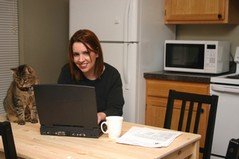Creating A Personal Budget
Step 3: Spending
The most exciting part of creating a personal budget is dealing with spending.
Huh?
You heard me correctly! It's exciting, because expense categories (or spending) is where you have the most control over your home budget.
You can't build wealth unless you have control over your money, and you can't have control over your money unless you have a realistic, effective budget.
What do I mean by control? Well, you can eliminate expenses, reduce expenses, speed up debt repayment, increase savings, increase investments...you get the picture.
Expenses And Spending Defined
If you're using zero-based budgeting, then "expenses" and "spending" are two different things.

Every dollar you earn goes somewhere. This is "spending". You can spend your money on a latte, or you can spend your money on a mutual fund in a Roth IRA. Either way, that money is gone from your checking account. Needless to say, some spending is good, and some is "bad" (if you're trying to build wealth).
Expenses are just one category of "spending". Money is exchanged for goods and services. There's no return in it for you. That latte in our example above? It's an expense. Good or bad? Depends on your budget.
When you're creating a presonal budget our way, you don't just include typical expenses like mortgage, groceries and entertainment. You also want to include "spending" on things like donations, savings, investments and debt repayment. Your goal is to always end up with a "zero" at the bottom-line of your budget, because that means you've accounted for every dollar of your take-home pay.
Let's Recap
Expenses are dollars you spend for goods and services. Includes mortgage, car payment, groceries, dry cleaning, etc.
Spending is allocating the dollars you earn. You can make expenditures, or you can put dollars towards debt, in savings accounts, or in investment accounts. Buying a mutual fund in your IRA is spending.
We're going to be using both terms as we begin creating a personal budget.
Now, let's get started figuring out your spending...
Fixed Expenses
The first (and usually largest) amount of spending you want to account for when creating a personal budget are known as fixed expenses.
Fixed expenses come due in regular periods (such as daily, weekly, monthly, quarterly, semi-annually, annually). They're usually the exact same amount each time, or fluctuate only slightly, as in the case of water or electric bills.
Some examples of fixed expenses include:
- Mortgage or rent
- Cable and internet
- Loan payments
- Regular savings and investment contributions
List all your fixed expenses the same way you listed your income, noting amounts and frequency they come due.
| Fixed Expense | Amount | Frequency |
| Mortgage | $1300 | Bi-Weekly |
| Spouse's Job | $1500 | Weekly |
Creating A Personal Budget - Step 3: Expenses page
to
How To Make A Budget page
